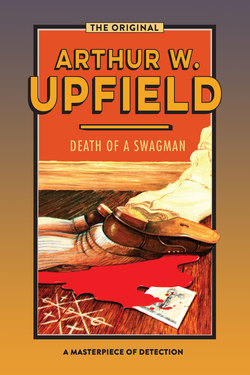Читать книгу Death of a Swagman - Arthur W. Upfield - Страница 11
На сайте Литреса книга снята с продажи.
Chapter Seven
ОглавлениеA Scar on Nature’s Handiwork
On the seventh day of his “imprisonment,” Bony suggested to Sergeant Marshall that they visit the hut at Sandy Flat in which the body of George Kendall had been found. The suggestion was readily accepted by the sergeant, who had been tied more than he liked to his desk.
That Bony should wait seven days before indicating a desire to visit the scene of the crime he was in Merino to unravel was to Marshall peculiar, to say the least, but those seven days had not been spent merely in painting government property. There had been the prolonged study of large-scale maps of the district to imprint on Bony’s mind the situation and layout of every surrounding station property, every road and track, every water hole and well. There had been hours spent on Detective Sergeant Redman’s reports and on the statements he had gathered. And Bony had got to know nearly every man and many women who lived at Merino.
It was a little before eleven o’clock on the morning of December fifth that they left Merino in the sergeant’s car, in the boot of which Mrs Marshall had herself placed a hamper and a tea billy. Once clear of the town, Bony said to the sergeant, who was wearing flannels and an open-necked shirt:
“I am a great believer in intuition. For instance, intuition never fails to warn me when my eldest son is about to ask for financial accommodation.”
“Doing well?” inquired Marshall, now hopeful that following a period of “closeness” Bony would be confidential.
“Very well. I am, secretly, proud of him. For that reason, when intuition warns me that a loan is about to be requested, to avoid paining him by a refusal, I make excuses to rush away. What is your opinion of the Rev. Llewellyn James?”
“Not much.”
“Do you mean that the opinion is not much in length or of value, or that the opinion is not favourable?”
“Even now I can’t tell whether you are serious or pulling my leg. I don’t like the Rev. Llewellyn James.”
“Officially or privately?”
“Privately, of course. Why be legal this morning?”
“I am in the mood for exactitude,” Bony told him, although his voice indicated the opposite. “What is the general opinion of James held by the people?”
The sergeant did not at once answer this question.
“The best way to deal with the subject,” he began, “is to make a comparison with the previous parson. James has been here four years and a bit. He arrived eight months after the other man left. The previous man was very well liked. He was elderly and a really great man who inspired love as well as respect. You know what is wanted in a parson by bush folk. To get on well with bush people, a parson has to be a man’s man as well as a churchman. James may be a good churchman, but he’s not a man’s man.”
“You do not seem confident that he is or is not a good churchman?” pressed Bony.
“That’s so. I don’t go to church. My wife does, however, and she says that James is better than no minister at all, and also that what he lacks is compensated by his wife.”
“Oh!” Bony made no other comment for a period. Then he said lazily: “You would not have had time to spare, as the statistician of every government department, to study criminology. That is a study thought unsuitable for real policemen, and so no time is allowed for it. I used once to compile data on the physical features of murderers and near-such, when it was proved how remarkably high is the percentage of killers having light blue eyes. James, you will recall, has light blue eyes.”
“Eh!” exclaimed the startled sergeant.
“Don’t let it worry you. Millions of people having light blue eyes go through life without committing a murder. We must not allow our natural reactions to Mr James to cloud our common sense. I mentioned the matter only for interest value. So that is the cemetery! Well! Well! It tells us its own history.”
“What does it tell?”
